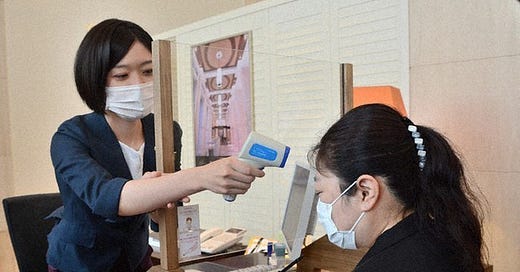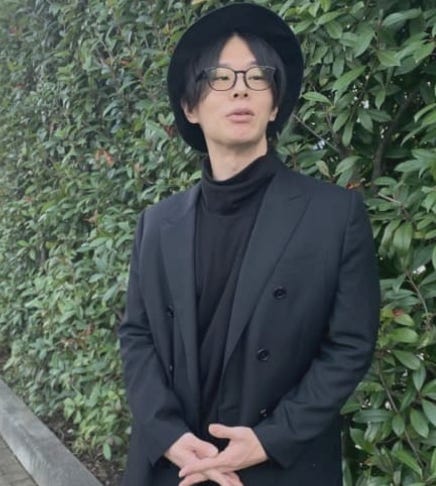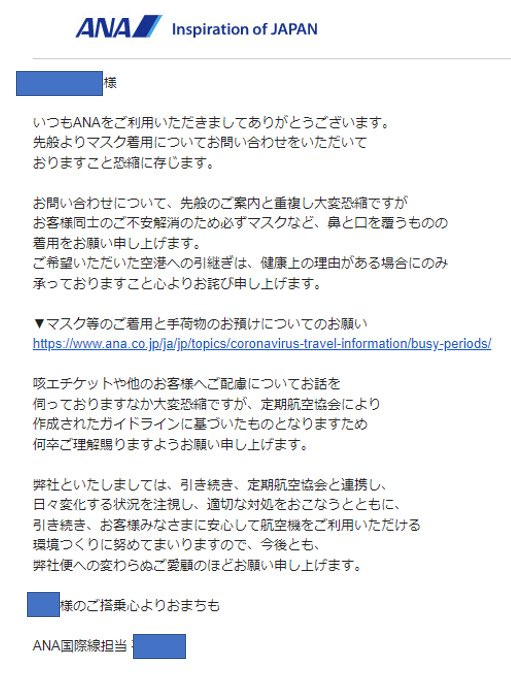Lawyer Yasunori Sakurai (pictured) is in the process of suing the 5-star Westin Hotel Tokyo (part of the Marriott Group) for refusing him accommodation because he was unmasked. The hotel claims it did no such thing. A recent article details the case and the legal issues around masks and other so-called infection prevention measures at hotels.
Masks? Don’t bother
Sakurai’s version of events is worth reading for an informative insight into the culture/cult of masking in Covid-era Japan.
When Mr Sakurai and his wife visited the hotel, neither had symptoms such as coughs or fevers. After checking-in, they headed to a members’ lounge that serves light snacks and alcohol. While choosing food from a buffet, a staff member asked him “Sir, do you have a mask?”
While Sakurai said nothing, the staff member repeated “Please put on a mask” five times. After Sakurai carried food back to his table and sat down, the hotel manager appeared and repeatedly called out, "Please wear a mask."
Sakurai replied, “Absolutely not. How am I supposed to eat while wearing a mask?”
The manager then said, “You’re bothering other guests. Do you know how to follow rules? I’ll call the police.”
Sakurai, who didn’t expect the police to come and wasn’t afraid of them being called, then said, “You’ll call the police, will you? When are they coming? That’s a threat.”
The manager again said, “You’re bothering other guests.”
At the table 1 or 2 meters to the right of Mr. Sakurai were two red-faced men who appeared to be drunk, and at the table to his left was a foreigner. None was eating and drinking while wearing masks. None of the staff, including the manager, asked the other guests to wear masks or stop talking.
Sakurai thought “The claim of bothering other guests was probably made up. But hotel staff don’t normally stand next to guests and converse with them, so from the perspective of other guests, the situation could’ve been annoying.” Sakurai and his wife left the lounge. The manager then told the still unmasked Sakurai “Please leave” and asked for the room key back. Sakurai passed the key back and didn’t go to the room in the end.
This incident may sound bizarre, but it seems to believable to me. People unfamiliar with Japan may be confused as to why the manager claimed Sakurai was “bothering other guests” and didn’t mention infections. There are several reasons for this.
Firstly, mask-wearing is a rule, and rules in Japan are to be followed regardless of logic in order to maintain social order and harmonious interpersonal relations. For example, the two bare-faced drinkers next to Sakurai most likely wore masks till they sat down (i.e. they followed the rules), so they weren’t a problem. The corollary is that rule-breakers, like Sakurai, should be punished.
Secondly, Japan is full of credulous TV viewers who’ve been conditioned to feel anxious when they see unmasked people walking about, and businesses cater to these neurotics. For example, in the reply email below, All Nippon Airways admits the point of universal masking on their planes is “anxiety relief” (不安解消) for other passengers and doesn’t mention infection prevention. This is presumably what the manager meant by Sakurai “bothering other guests.”
No room at the inn?
So can you be refused accommodation for being unmasked? The answer is “Not yet.”
Under the Hotel Business Act, guests cannot be refused entry for being unmasked. However, in response to calls from hotel operators, the government approved a revised bill in October. Put simply, the revised bill states that "guests who are suspected of being infected during an epidemic/pandemic and refuse to take infection control measures without valid reasons may be refused accommodation." However, the relationship between infection control and masks is unclear, and the revised bill has not yet been passed by the Diet.
After about 10% of hotels had gone out of business by August 2022, you’d think that the hotel industry here would be screaming at the government to let society return to normal. But this is Japan. As demonstrated in the incident above, the fact that “the relationship between infection control and masks is unclear” doesn’t matter. What matters is that they work as a comfort blanket for many people.
So if the Diet eventually passes revisions to the Hotel Business Act, Covidian hotel managers will be able to refuse entry to unmasked guests who are symptomatic. But a bigger problem is that hotels will also be able to tell guests to be tested at a hospital.
The revised bill allows different responses to symptomatic and asymptomatic guests. For symptomatic people suspected of being infected, hotels can request they take infection prevention measures such as masking/disinfection and undergo a medical examination at a hospital and refuse entry if the guest refuses without a valid reason. On the other hand, people without symptoms can be refused accommodation if they do not comply with temperature checks and health status confirmation, but they cannot be refused accommodation even if they refuse to wear masks or disinfect their hands.
In this case, “health status confirmation” is envisioned to be a questionnaire of recent travel history. But the main problem here is the treatment of people “suspected” of being infected. And that’s not just my opinion. Here’s Seiji Kuroki, vice-chairman of the Human Rights Commission of the Japan Federation of Bar Associations (JFBA).
“It is excessive to limit the rights of people who are suspected of having Covid. The trend of refusing people suspected of having Covid or other illnesses may spread even to industries other than inns and hotels.”
I had assumed that was the government’s hope.
The JFBA has also warned that the revised law could be used for discriminatory purposes.
"[The revised law] will send the wrong message that infected people and people suspected of being infectious are a danger and a nuisance to society, so we can reject them."
To back up their point, the JFBA cites an incident in 2003 when recovered leprosy patients were illegally refused entry to a hotel because the hotel expected they would (surprise, surprise) “bother other guests”. So if the revised bill is passed, it would allow hotels to literally treat anyone with a high temperature worse than a leper.
Mr. Sakurai, himself a lawyer, feels similarly about the tyranny of the majority.
“The right to self-determination guaranteed by Article 13 of the Constitution includes being able to breathe comfortably without wearing a mask and to live bare faced. In Japan, the unmasked minority are rejected and casually told ‘It’s just a mask.’ Precisely because of this peer-pressure to conform, this issue is the number one priority for human rights protection.”
Let’s hope the revised Hotel Business Act doesn’t pass. But if it does, it won’t be first law to be made worse “due to Covid”.







We visited Japan many times on holiday. Our last trip was Nov/Dec 2019. We long to return, but with great sadness we believe this may never happen. We are not vaccinated and refuse to wear masks, which has not been an issue for more than a year in the UK. A proposed May 2023 trip has been postponed to November, in the hope that restrictions may lessen, but we have booked flexible flights with full refunds available because we suspect the situation will not change. If Japan wishes European visitors to return, it has a strange way of showing it. Japanese hotel websites, in their zeal to assure prospective visitors of how “safe” they will be, serve only to fill us with horror at the thought of constant temperature testing and mask wearing. Holidays are supposed to be a pleasure, rather than a penance.
I would like to add that the peer pressure to conform also lead to the bayonetting of small children in Nanjing, China. I am in no way comparing the reduction of oxygen intake to the bayonetting of children because everyone knows that the former is slow death whereas the latter death is instantaneous. Let's stop calling it peer pressure. Let's call it what it really is: cowardice. On my way to the coffee shop, in the coffee shop, and on the way home I encountered about 400 cowards and about 5 who seemed capable of thinking. I did not feel afraid of the non-thinkers because they are basically cowards. They may have strength in numbers. Any one who has seen the documentary Dawn of the Dead knows this.